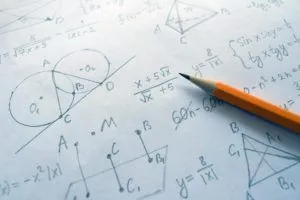Knowing how to revise for GCSE Math isn’t something that comes easy. At least, it’s not as easy as the teachers will make it seems when they say “Make sure you revise for your exams next week”, especially when they haven’t taught the necessary skills for revision.
Mathematics can be a tricky subject, but with the right approach, revising for your GCSE can become a breeze.
Lots of students are worried about how to revise for a GCSE Math; not knowing the proper means to do your revision can be a pain in the neck. However, there are workable and effective ways to revise for your GCSE math and that’s what this content will teach you.
In this ultimate guide, we’ll break down the steps to help you ace your Math GCSE revision. From tackling tricky equations to mastering essential concepts, we’ve got all the tips you need to succeed.
Table of contents
- GCSE Maths Subjects and Course Content
- GCSE Maths Exam Format
- When should GCSE revision start?
- What’s a Good Grade for GCSE Maths?
- How To Revise For Maths GCSE?
- Tip 1: Engage in Active Practice
- Tip 2: Rotate Through Different Topics
- Tip 3: Learn from Exam Questions
- Tip 4: Understand the Mark Scheme
- Tip 5: Gradually Reduce Reliance on Notes
- Tip 6: Explain Your Work
- Tip 7: Don’t Miss Easy Marks
- Tip 8: Simulate Exam Conditions
- Tip 9: Manage Your Time
- Tip 10: Non-Linear Question Approach
- Tip 11: Explore Other Exam Boards
- Tip 12: Don’t Overdo It
- Conclusion
- Frequently Asked Questions
- References
- Recommendations
GCSE Maths Subjects and Course Content
GCSE Maths, or General Certificate of Secondary Education in Mathematics, is a standardized qualification in mathematics typically taken by students in the UK at the age of 16.
The course covers various mathematical topics and concepts, providing students with a solid foundation in mathematics. Here are the key subjects and course content typically included in GCSE Maths:
Number and Arithmetic:
- Place value and ordering numbers
- Fractions, decimals, and percentages
- Ratio and proportion
- Powers and roots
- Standard form
- Calculations with whole numbers and decimals
Algebra:
- Expressions and equations
- Linear and quadratic equations
- Inequalities
- Sequences
- Graphs and functions
- Simultaneous equations
- Expanding and factorizing expressions
Geometry and Measures:
- Angles and lines
- Properties of shapes, including triangles, quadrilaterals, and circles
- Area and perimeter
- Volume and surface area
- Transformations, including reflections, rotations, and translations
- Pythagoras’ theorem and trigonometry
Check out this related content: 10 Best Laundry Bags for Your College Dorm in 2024
Statistics and Probability:
- Data representation and interpretation
- Frequency tables and histograms
- Measures of central tendency (mean, median, mode)
- Probability and probability distributions
- Scatter plots and correlation
- Sampling and surveys
Ratio, Proportion, and Rates of Change:
- Direct and inverse proportion
- Percentage change
- Conversion between units
- Compound measures
Probability:
- Probability calculations
- Tree diagrams and Venn diagrams
- Conditional probability
Statistics:
- Data representation (bar charts, pie charts, etc.)
- Measures of spread (range, interquartile range, standard deviation)
- Cumulative frequency
Assessment and Problem Solving:
- Solving mathematical problems and puzzles
- Applying mathematical skills to real-life scenarios
- Mathematical reasoning and proof
Practical Mathematics:
- Using calculators and other mathematical tools effectively
- Interpreting mathematical information from various sources
The GCSE Maths curriculum is designed to equip students with mathematical knowledge. It is assessed through written examinations, and the level of qualification can vary from Foundation tier (for grades 1-5) to Higher tier (for grades 4-9), with grade 4 often being considered a standard pass.
GCSE Maths Exam Format
The GCSE Maths exam format can vary slightly depending on the exam board, but generally, it consists of two written papers: one calculator paper and one non-calculator paper. Here’s an overview of the typical format:
Paper 1: Non-Calculator Paper
- Duration: Approximately 1 hour and 30 minutes.
- Content: This paper assesses your ability to perform mathematical calculations without the use of a calculator. It covers topics like numbers, algebra, geometry, and statistics.
- Question Types: The questions may include multiple-choice questions, short-answer questions, and longer, more structured questions.
- Assessment: This paper usually contributes to 33.3% of your overall GCSE Maths grade.
Paper 2: Calculator Paper
- Duration: Approximately 1 hour and 30 minutes.
- Content: This paper allows the use of a scientific calculator. It assesses your ability to apply mathematical concepts and problem-solving skills to a wide range of topics, including algebra, geometry, statistics, and more.
- Question Types: Similar to Paper 1, you can expect multiple-choice questions, short-answer questions, and longer, more structured questions.
- Assessment: This paper typically contributes to 33.3% of your overall GCSE Maths grade.
Assessment Objectives:
In both papers, your performance is assessed according to several assessment objectives:
- Use and apply standard techniques: This involves demonstrating your understanding of mathematical concepts and your ability to use standard mathematical techniques to solve problems.
- Reason, interpret, and communicate mathematically: You need to show your capacity to reason mathematically, interpret results in the context of a problem, and communicate your solutions effectively.
- Solve problems within mathematics and other contexts: This assesses your problem-solving skills, not only in pure mathematical scenarios but also in real-life contexts.
Grading:
The grading for GCSE Maths ranges from grade 9 (the highest) to grade 1 (the lowest). Grade 4 is typically considered a standard pass, while grades 5 and above are considered strong passes. The grading is based on a combination of your performance in both papers and can be influenced by the tier (Foundation or Higher) you have chosen to take.
Also check out this content: Top Companies That Offer Tuition Reimbursement to Students in 2024
Additional Assessment Components:
In addition to the two main written papers, there may be other components, such as coursework or controlled assessment, depending on the specific exam board or the year in which you are taking the exam.
However, these additional components have become less common in recent years due to changes in the GCSE system. It’s essential to check with your school or exam center for the most up-to-date information on the exam format and any additional requirements.
Check out this related content: 10 Best Laundry Bags for Your College Dorm in 2024
When should GCSE revision start?
GCSE revision should ideally start well in advance of the actual exams. The specific timing can vary depending on individual preferences, learning styles, and the subjects being studied. Here are some general guidelines to help you plan when to start your GCSE revision:
- Long-Term Preparation (1-2 Years Before Exams): It’s never too early to start building a strong foundation in your GCSE subjects. Pay attention in class, complete your homework diligently, and seek help when needed. Consistent effort throughout your studies can reduce the need for intense last-minute revision.
- Mid-Term Preparation (6-12 Months Before Exams): This is an ideal time to begin structured revision. Create a revision schedule that allocates time for each subject, focusing on areas where you need improvement. Use this period to master key concepts and build confidence.
- Short-Term Preparation (3-6 Months Before Exams): As the exams approach, intensify your revision efforts. Start practicing past papers, work on sample questions, and develop exam techniques. Identify your weaknesses and address them systematically.
- Final Sprint (1-3 Months Before Exams): In the final weeks leading up to the exams, your revision should be in full swing. Focus on exam-specific strategies, time management, and fine-tuning your knowledge. Regularly review and practice past papers to get a feel for the exam format.
- Exam Readiness (1-2 Weeks Before Exams): During this period, focus on consolidating your knowledge and reducing stress. Review key formulas and concepts, but avoid cramming. Get sufficient rest, maintain a healthy diet, and manage stress through relaxation techniques.
- Exam Days: On the actual exam days, arrive early, stay calm, and approach each paper with confidence. Remember that you’ve prepared to the best of your ability.
Consistency is key throughout your GCSE studies. Starting early and maintaining a regular revision routine can help you retain information better and reduce the stress associated with last-minute cramming. Additionally, seeking support from teachers, tutors, or study groups can provide valuable guidance and motivation throughout your revision journey.
You should read: How to Pay Off Your Student Loans in 5 Years: A Step-by-Step Guide
What’s a Good Grade for GCSE Maths?
A good grade for GCSE Maths can vary depending on your individual goals and aspirations. In the UK, GCSE grades range from 9 (the highest) to 1 (the lowest), with a few additional grades such as U (ungraded) and G (a grade lower than 1).
Here’s a general guideline for what different grades in GCSE Maths might mean:
- Grade 9: This is the highest grade and is often considered exceptional. Achieving a grade 9 typically demonstrates an excellent understanding of the subject and is often required for entry into advanced mathematics courses or for highly competitive academic programs.
- Grades 7-8: These are strong passes and indicate a very good understanding of GCSE Maths. They are often sufficient for many further education courses and career paths, including some STEM (Science, Technology, Engineering, and Mathematics) fields.
- Grade 6: This is considered a standard pass and demonstrates a good understanding of the subject. It is often the minimum requirement for many further education courses and apprenticeships.
- Grade 4-5: These are also considered standard passes, although some educational institutions and employers may prefer a grade 5 or above. These grades show a reasonable grasp of the subject.
- Grade 3 and Below: Grades 1 to 3 may be considered a limited pass or not a pass at all. These grades may indicate that you need additional support or revision if you plan to pursue further studies or careers that require a good level of mathematical proficiency.
The grade you aim for should align with your aspirations and the specific requirements of the colleges, universities, or employers you plan to apply to. It’s a good idea to research the specific entry requirements for your desired path and work toward achieving the grades necessary to reach your goals. Additionally, remember that effort, understanding, and progress are more important than the specific grade you achieve, as they reflect your true mastery of the subject.
Also check out this content: What the NMQST is and Why is it so Important?
How To Revise For Maths GCSE?
Tip 1: Engage in Active Practice
If you want to master GCSE Maths, the key is practice, practice, and more practice. Reading and watching videos can help, but it’s the time spent attempting questions that truly make a difference. Don’t wait until the exams are around the corner; make practice a habit throughout the year.
Tip 2: Rotate Through Different Topics
Diversify your GCSE Maths revision by dedicating a short daily session to various topics. Corbettmaths 5-a-day is a fantastic resource for this, offering questions from basic numeracy to advanced levels. Keep things fresh in your mind by revisiting different subjects regularly.
Check out this related content: What you should know about Student Loan “Principal Balance?’
Tip 3: Learn from Exam Questions
As you gain confidence in a topic, start tackling exam-style questions. Websites like Maths4Everyone, MathsGenie, and JustMaths offer collections of questions with solutions. Analyze your answers, identify mistakes, and seek help if needed. Don’t hesitate to join study groups or online communities for assistance.
Tip 4: Understand the Mark Scheme
Get familiar with the mark schemes provided by exam boards. This will help you gauge your performance and refine your presentation to maximize your marks.
You should read: 10 Best Architectural and Engineering Managers Colleges in 2024
Tip 5: Gradually Reduce Reliance on Notes
While starting your GCSE Maths revision, it’s fine to refer to your notes and formula sheets. However, challenge yourself to rely on them less over time. Create flashcards to reinforce your memory of rules and formulas.
Tip 6: Explain Your Work
When answering questions, use words and phrases to explain your thought process. Imagine you’re teaching another student how to solve the problem. Clear explanations can help you earn more marks, especially in proof questions.
Check out this related content: What To Do When Student Loan Account Is Closed Due To Transfer
Tip 7: Don’t Miss Easy Marks
Even on challenging questions, attempt the first step. For questions with “prove,” “show,” or “verify,” always restate the question’s statement at the end. On multiple-choice questions, make your best guess if unsure. Don’t forget to include units in your answers when required.
Tip 8: Simulate Exam Conditions
Start practicing to complete papers about six months before the GCSE exam. Gradually reduce your reliance on notes and adhere to time limits. Review and improve areas where you struggle.
Tip 9: Manage Your Time
Keep track of time during the exam. Allocate time wisely to avoid getting stuck on a single question. If needed, return to difficult questions later. Finish any unanswered questions, especially those with easy marks, if time allows.
Also check out this content: How to Submit the FAFSA To More Than 10 Colleges
Tip 10: Non-Linear Question Approach
Begin your exam paper with questions you find most comfortable. This helps build confidence and prevents early frustration on challenging questions.
Tip 11: Explore Other Exam Boards
Don’t limit yourself to your specific exam board’s papers. Explore materials from other boards; the differences are minimal, especially in Foundation-level GCSE Maths.
Tip 12: Don’t Overdo It
Avoid marathon study sessions. Take regular breaks, engage in physical activity, eat well, and stay hydrated. Revise GCSE Maths for a couple of hours each day, as excessive studying can reduce effectiveness. Remember, balance is key!
Also check out this content: 10 Smart Questions to Ask on a College Tour | Act Smart
Conclusion
Revising for your Math GCSE doesn’t have to be a daunting task. With dedication, organization, and the right strategies, you can conquer this subject and excel in your exams. Remember, practice makes perfect, and a positive attitude can go a long way. So, roll up your sleeves, put in the effort, and watch your math skills soar. You’ve got this!
Also check out this content: What If My Family Can’t Meet Our EFC? Best Alternative
Frequently Asked Questions
Start by organizing your study materials and creating a study schedule. Identify your weak areas and prioritize them. Set specific goals and break your revision into manageable chunks.
Begin with a strong foundation by reviewing the basics. Then, progress to more advanced topics gradually. Use online resources, and textbooks, and ask your teacher for help when needed. Practice problems and seek clarification on any doubts.
Make math fun by using visual aids, such as graphs and diagrams. Try out interactive math apps or games. Form a study group with friends and quiz each other. Experiment with different learning methods to find what works best for you.
Time management is crucial. Create a study timetable that allocates specific times for different topics. Avoid procrastination, take short breaks, and stay consistent with your schedule. Prioritize difficult subjects while staying balanced.
The night before the exam, review key formulas and concepts but don’t cram. Get a good night’s sleep, eat a balanced meal, and gather all necessary materials (ID, calculator, etc.). Stay calm, believe in yourself, and trust in your preparation.
References
- thinkstudent.co.uk– how to revise for Maths GCSE
- rsleducational.co.uk– how to revise for Maths GCSE
- b28mathstutor.co.uk– how to revise for Maths GCSE
- tutordoctor.co.uk– how to revise for Maths GCSE






